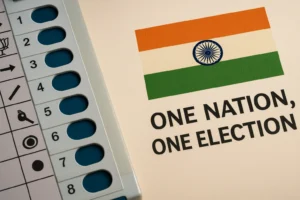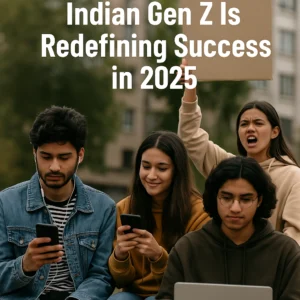Reels, Rage, and Reality: The New Aspirations of Indian Gen Z

Young Indian Gen Z individuals blending technology, activism, and self-expression in a fast-changing urban India.
A Generation on a Different Frequency
Spend five minutes on any metro’s local train in India and you’ll likely spot a young adult editing an Instagram reel, another flipping between Coursera and YouTube, and a third tuning into a Korean drama while wearing a hoodie that says “Be Real.” That’s Indian Gen Z in a nutshell: hyper-connected, multitasking, and redefining ambition on their own terms.
Born between the late 1990s and early 2010s, Indian Gen Z is no longer the future—they’re the present. They make up a massive chunk of the nation’s workforce, voters, and consumers. But their dreams, frustrations, and identities look radically different from any generation before them.
In a country that once saw success through the narrow lens of engineering colleges, UPSC ranks, and stable government jobs, Indian Gen Z is flipping the script. Not with rage for the sake of it—but with intention. Their ambitions are not louder—they’re just more layered.
Table of Contents
The Collapse of the Old Dream
For a long time, the Indian middle-class roadmap was predictable: good marks, a respected degree, a decent job, marriage by 28, kids by 30. That model, once seen as safe and sensible, now feels suffocating to many in Gen Z.
This generation has grown up during some of the most volatile years in recent history—recessions, climate emergencies, the pandemic, tech layoffs, and political polarization. They’ve seen how even “safe” jobs aren’t really safe, and how degrees don’t guarantee respect or income.
As a result, Indian Gen Z isn’t chasing old definitions of success. They’re building new ones. Ask them what they want, and you’ll hear things like “flexibility,” “impact,” or “personal brand” more often than “promotion” or “pay grade.”
The Reel Economy: Not Just for Fun Anymore
Social media is often dismissed as shallow entertainment. But for Indian Gen Z, it’s an engine of opportunity. Platforms like Instagram, YouTube, Moj, and even LinkedIn have become stages to perform, educate, sell, and connect. Many Gen Z creators aren’t just chasing viral fame—they’re building serious revenue streams.
Take the case of Anjali, a 22-year-old from Indore who teaches spoken English on YouTube. She makes more than a private tutor in Delhi. Or Ritesh, a self-taught graphic designer from Guwahati who landed international freelance gigs through LinkedIn DMs. These stories are not exceptions anymore—they’re multiplying.
Unlike millennials who waited for degrees or company titles before starting careers, Indian Gen Z begins now. If the institution doesn’t give them a chance, they’ll build a community and sell their skill directly. No gatekeepers.
Digital Rage: Activism as Identity
But Indian Gen Z is not all about money and aesthetics. If there’s one thing this generation won’t tolerate, it’s silence in the face of injustice. From the CAA protests and climate marches to online movements for mental health and LGBTQ+ rights, Indian Gen Z is engaged—deeply and fearlessly.
Their activism isn’t always loud. Sometimes it shows up as a black square, a boycott, a fundraiser, or a reel calling out casual sexism. But make no mistake—this is a politically alert generation. They expect institutions to be transparent and brands to have ethics. They’re not afraid to call out hypocrisy, whether it’s in Parliament or on a college WhatsApp group.
To older generations, it might feel like outrage. To Indian Gen Z, it’s just honesty.
The Struggle to Stay Sane
Yet, living online has its costs. Indian Gen Z may be the most expressive and empowered generation, but they’re also more vulnerable to burnout, anxiety, and loneliness.
They’re constantly comparing themselves—not just to peers but to polished influencers and viral prodigies. The pressure to “make it young” is immense. Behind the upbeat stories and carefully edited reels are young people overwhelmed by the need to keep up.
However, unlike their parents, they’re not afraid to admit it. The stigma around therapy is fading. Many openly discuss their battles with anxiety, imposter syndrome, or gender dysphoria. Apps like MindPeers and InnerHour are booming. The vocabulary of emotional intelligence—once alien to Indian homes—is now everyday lingo among Indian Gen Z.
Also read out Why Indian Startups Are Migrating to Dubai in 2025.
Redefining Careers—and Where They Happen
This generation doesn’t want to live in big cities just to prove ambition. Thanks to remote work, gig platforms, and digital entrepreneurship, many are finding success from small towns and hill stations. Careers no longer mean cubicles. A stable job is less attractive than a flexible life.
For instance, platforms like Fiverr, Toptal, and Upwork have thousands of Indian Gen Z freelancers offering everything from video editing and coding to resume writing and astrology. Many start earning in college, sometimes even before.
Degrees still matter, yes—but they’re no longer sacred. A resume without a portfolio or online presence feels incomplete in Gen Z’s world.
Not Followers, But Community Builders
Culture is where Indian Gen Z truly diverges. They don’t idolize Bollywood the way older generations did. Instead, they follow indie musicians, Korean artists, regional comedians, and niche meme pages. They build fandoms, not just follow them.
Many also find community in language and identity. A Tamil-speaking Gen Z creator might blend classical Bharatanatyam with trending pop music. A Dalit poet might use reels to recite resistance verses. It’s not about fitting into one idea of “Indian.” It’s about multiplying the possibilities.
What Indian Gen Z Really Wants
To understand Indian Gen Z is to understand contradiction. They want to hustle—but not burn out. They care about money—but not at the cost of meaning. They’re loyal to causes—but not to brands. They’re digital-first—but also desperately searching for real, offline connection.
Most importantly, they want to be heard—not just seen.
You may also read Understanding Gen Z, the generation without history.
The Final Word
The old systems—be it education, employment, or entertainment—were not built for the speed and sensitivity of this generation. And Indian Gen Z knows it. Rather than wait for them to adapt, they are reshaping these systems entirely.
They’re not a distracted generation. They’re just done with outdated templates. And if India listens carefully, it might just discover a blueprint for a better future—one reel, one protest, one quiet breakthrough at a time.




